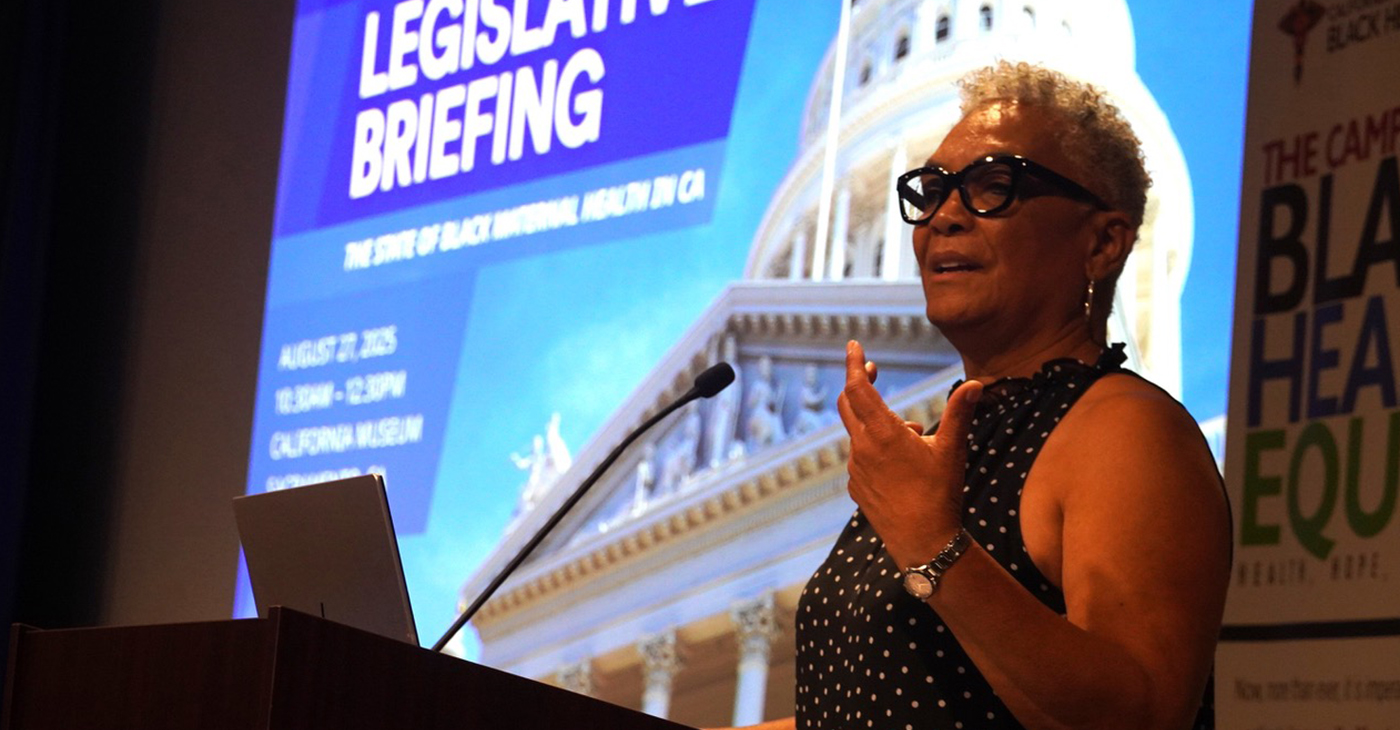Antonio Ray Harvey
Gov. Newsom Vetoes Cannabis Café Bill
In his veto message, Newsom said he appreciates the author’s intention to support cannabis retailers, many of them struggling to make a profit. However, he is concerned that the legislation “could undermine California’s long-standing smoke-free workplace protections.”

By Lila Brown | California Black Media
On Oct. 8, Gov. Newsom vetoed Assembly (AB) Bill 374.
This legislation would have allowed business owners to operate cannabis cafés in California, like those in Amsterdam, where non-marijuana food products can be served and consumed. This is despite the existing federal ban on the entire industry.
The bill, authored by Assemblymember Matt Haney (D-San Francisco), would have also allowed café owners to host and sell tickets to live events.
In his veto message, Newsom said he appreciates the author’s intention to support cannabis retailers, many of them struggling to make a profit. However, he is concerned that the legislation “could undermine California’s long-standing smoke-free workplace protections.”
“Protecting the health and safety of workers is paramount. I encourage the author to address this concern in subsequent legislation,” wrote the Governor.
Responding to Newsom’s decision to return AB 374 unsigned, Haney drew parallels to California’s wine industry in a statement released Sunday.
“Californians are proud of our state’s wine culture, and we do everything we can to make sure that our winemakers receive the support they need — we need to be doing the exact same thing for cannabis,” he wrote. “If we don’t start better supporting these businesses, we are going to lose decades of being at the forefront of the cannabis movement and other states will be ready to swoop in and take it from us.”
Throughout the legislative process the bill has attracted both praise and criticism with some applauding it for the business opportunities it presents and others expressing strong disapproval because of health concerns such as second-hand smoke.
“Lots of people want to enjoy legal cannabis in the company of others,” said Haney. “And many people want to do that while sipping coffee, eating a scone, or listening to music.”
For owners of cannabis product stores, AB 374 presented opportunities to scale up their businesses.
Nina Parks is a co-founder of Equity Trade Network, a non-profit collective that provides small businesses with supply chain business resources within the cannabis industry in California.
She also served on the Cannabis Oversight Committee in San Francisco where she advocated for more equity as regulation was being developed. She said her cannabis lifestyle brand, Gift of Doja was set to resume hosting live, curated events that promote safe social spaces.
Parks told California Black Media (CBM) that AB 374 is a step in the right direction.
“The ability to at least have non-cannabis foods being able to be sold at dispensaries also gives dispensary owners an opportunity to put another revenue stream in their business.
“Being able to have non-cannabis related sales in your establishment really allows for another revenue stream for store owners. It is also an opportunity for cannabis businesses to remove the stigma and normalize consumption,” says Parks.
In cities like Los Angeles where programs are in place to help people affected by the War on Drugs — and other low-income entrepreneurs — launch cannabis-related businesses, the legislation was seen as offering hope.
Los Angeles Mayor Karen Bass is working to expand business licensing and compliance for Social Equity applicants and licensees to receive guidance from marijuana industry experts.
A Social Equity Individual Applicant is defined as an individual who fulfills at least two of the following three criteria: (1) Low-income; (2) a prior California cannabis arrest or conviction; (3) 10 years’ cumulative residency in a disproportionately impacted area.
While consuming cannabis on-site at cannabis retailers is technically legal in California, selling non-cannabis-infused products is not permitted.
Supporters of AB 374 said the bill would have allowed cannabis retailers to diversify their operations and transition away from the limited dispensary model by selling non-cannabis-infused foods.
“It should have happened a long time ago. We let Colorado and other states go before us and California should’ve been the state to have already perfected this, says Brian Johnson, 51, an entrepreneur in Orange County.
As a shop owner and cannabis advocate, Johnson is eagerly waiting for his vision to become a reality. He blames red tape and excessively high taxes as obstacles to progress. However, like most cannabis entrepreneurs, he remains enthusiastic.
“Those who were criminalized and got their record expunged can get back to their entrepreneurial spirit,” says Johnson.
The strongest opposition to AB 374 came from advocates who argued that the legislation would erase decades of health safeguards put in place for businesses to protect employees by maintaining smoke-free work environments.
“Workers should not have to choose between their health and a good job. California has fought hard to protect workers and ensure a safe, healthy, smoke-free work environment,” the American Cancer Society, Cancer Action Network, the American Heart Association and the American Lung Association wrote in a letter of opposition to the legislation.
Antonio Ray Harvey
$96 Million Allocated So Far to Black-Owned Firms as High-Speed Rail Project Expands Jobs, Boost Local Economies
Sen. Lola Smallwood-Cuevas (D-Los Angeles), a member of the California Legislative Black Caucus (CLBC) and Chair of the Senate Committee on Labor, Public Employment and Retirement, says the rail project “is exactly the kind of investment” California needs.

By Antonio Ray Harvey, California Black Media
As of May 31, the most recent data from the California High-Speed Rail Authority shows that 47 African American-owned firms are participating in the project as Disadvantaged Business Enterprises (DBEs).
A total of 936 Certified Small businesses are working on the high-speed rail program statewide, representatives of the high-speed rail project say.
The number of Black-owned DBE firms (5.2%) accounts for $96 million of the $1.136 billion allocated to minority firms thus far.
Sen. Lola Smallwood-Cuevas (D-Los Angeles), a member of the California Legislative Black Caucus (CLBC) and Chair of the Senate Committee on Labor, Public Employment and Retirement, says the rail project “is exactly the kind of investment” California needs.
Smallwood-Cuevas, speaking in Aug. 25 at the State Capitol Swing Space Annex — along with a coalition of Democratic state legislators and union leaders — provided an update on the California High-Speed Rail project and its efforts to employ people from the Black community and businesses.
“It builds a cleaner, more connected California while creating thousands of union jobs,” said Smallwood-Cuevas. “And we must ensure workforce equity, with pathways that open doors for workers who too often have been left out of good-paying careers.”
The remaining DBE minority-owned firms received the following amounts:
- Asian Subcontinent: 24 firms received approximately $65 million
- Asian-Pacific Islander: 52 firms received approximately $86 million
- Native American: 6 firms received approximately $39 million
- Hispanic/Latino: an unspecified number of DBE businesses received approximately $848 million
There are currently 328 certified DBEs participating in the project, according to the California High Speed Authority. The multi-billion-dollar project is billed to be committed to small, disabled, disadvantaged, and diverse businesses playing a major role in building the statewide high-speed rail project.
“As a Central Valley native, I know firsthand how transformative high-speed rail will be for our communities,” stated Assemblymember Lori D. Wilson (D-Suisun City) a member of the CLBC and Chair of the Assembly Transportation Committee.
“Stable and sustained funding is essential to delivering this project and fulfilling the promise made to voters.”
The news conference was hosted by Senate Transportation Chair, Sen. Dave Cortese (D-San Jose), who was promoting Senate Bill (SB) 545. He and the California High-Speed Rail Authority (CHSRA) urged the Legislature to commit to a steady, annual investment from a cap-and-trade program to fund the high-speed rail project.
Dr. Melanie Okoro, the Principal and Chief Executive Officer of Eco-Alpha, attended the briefing. Eco-Alpha is a Sacramento-headquartered small, women-owned, minority-certified firm.
The company, not classified as a DBE, earned its status as a certified small business and a certified women-minority small business through the California Public Utilities Commission (CPUC) and the Department of General Services (DGS). The certification allowed Eco-Alpha to be featured by CHSRA as a small business working on the project.
The Black-owned firm provides engineering and environmental services to the California High-Speed Rail project, primarily focused on facilities operation and Maintenance.
Okoro said laborers are not the only workers benefiting from the project. Professionals of color in engineering, with specialized knowledge and problem-solving skills to design, build, and maintain a wide array of structures, systems, and products, are looking forward to these “great opportunities.”
Activism
Sacramento: Lawmakers Hear From Health Advocates on “State of Black Maternal Health”
Participants highlighted several past and current bills going through the state Legislature that focus on improving maternal health equity. The proposals address systemic inequities to improve the healthcare experiences of Black women during pregnancy, labor, and postpartum.

By Antonio Ray Harvey, California Black Media
Adjoa Jones is a Los Angeles-based health and community leader who has dedicated her career to advocating for equitable birth outcomes for Black mothers and infants.
Participating in a legislative briefing hosted by the California Black Health Network (CBHN) on Aug. 27, Jones shared stories that shed light on the disproportionately high rate of pregnancy-related complications and deaths among Black women.
Two Black women in Southern California, Jones says, suddenly passed away after giving birth. From Jones’s perspective, those maternal mortalities could have been prevented.
“I come to you speaking from the voices of our community. From the stories of two unforgettable mothers, but it really speaks to the most preventable tragedies,” said, Jones, who is the Director of African American Infant and Maternal Mortality Prevention Initiative at the L.A. County Department.
“It’s not just impacting California, but our nation far and wide,” Jones added during the event titled “The State of Black Maternal Health” and held at the California State Museum in Sacramento.
Participants highlighted several past and current bills going through the state Legislature that focus on improving maternal health equity. The proposals address systemic inequities to improve the healthcare experiences of Black women during pregnancy, labor, and postpartum.
Panelists included Sandra Poole, Health Policy advocate for the Western Center on Law and Poverty, and Brittany Chambers, Associate Professor for the Department of Human Ecology at the University of California at Davis.
Other panelists were Palav Babaria, Deputy Director for the California Department of Health Care Services, and Zea Malawa, Director of Expecting Justice.
Rhonda Smith, the Executive Director of CBHN, served as the host and moderator of the briefing.
“There are amazing and incredible women who are doing amazing work here in the state,” Smith said of the panelists who discussed potential policy solutions and accountability.
During Jones’ presentation, she shared the tragic stories of two women. One was April Valentine, who died on Jan. 10, 2023, after giving birth at Centinela Hospital Medical Center in Inglewood.
According to reports, Valentine died from a blood clot, a pulmonary embolism, that formed in her leg and circulated to her lung. A well-known complication during pregnancy. Valentine’s family members said her condition was preventable, and they filed a wrongful-death claim.
The second woman, 32-year-old Briget Cromer, died in 2023 at California Hospital Medical Center, hours after giving birth to her fifth child. Her family believes her death was due to medical negligence.
Her family’s legal team filed a formal complaint with the U.S. Department of Health and Human Services (USDHH) alleging systemic racial bias in care.
According to the California Department of Public Health, Black women are more likely than their counterparts to die during pregnancy. They represent 5% pregnancies in the state but account for 21% of pregnancy-related deaths.
“We’re doing all that we can to ensure that pregnancy is uplifted (and) pregnancy is a place that’s where folks can enjoy the journey, Jones said.
Sen. Akilah Weber Pierson (D-San Diego), an obstetrician-gynecologist, was the keynote speaker.
“Here in California, we tragically lose another mother due to pregnancy-related complications every five days,” Weber Pierson said. “Here and nationally, Black mothers are three to four times likely to be one of those mothers lost. That’s coming from 40% of maternal deaths.”
Antonio Ray Harvey
Air Quality Board Rejects Two Rules Written to Ban Gas Water Heaters and Furnaces
The proposal would have affected 17 million residents in Southern California, requiring businesses, homeowners, and renters to convert to electric units. “We’ve gone through six months, and we’ve made a decision today,” said SCAQMD board member Carlos Rodriguez. “It’s time to move forward with what’s next on our policy agenda.”

By Antonio Ray Harvey
California Black Media
Two proposed rules to eliminate the usage of gas water heaters and furnaces by the South Coast Air Quality Management District (SCAQMD) in Southern California were rejected by the Governing Board on June 6.
Energy policy analysts say the board’s decision has broader implications for the state.
With a 7-5 vote, the board decided not to amend Rules 1111 and 1121 at the meeting held in Diamond Bar in L.A. County.
The proposal would have affected 17 million residents in Southern California, requiring businesses, homeowners, and renters to convert to electric units.
“We’ve gone through six months, and we’ve made a decision today,” said SCAQMD board member Carlos Rodriguez. “It’s time to move forward with what’s next on our policy agenda.”
The AQMD governing board is a 13-member body responsible for setting air quality policies and regulations within the South Coast Air Basin, which covers areas in four counties: Riverside County, Orange County, San Bernardino County and parts of Los Angeles County.
The board is made up of representatives from various elected offices within the region, along with members who are appointed by the Governor, Speaker of the Assembly, and Senate Rules Committee.
Holly J. Mitchell, who serves as a County Supervisor for the Second District of Los Angeles County, is a SCAQMD board member. She supported the amendments, but respected the board’s final decision, stating it was a “compromise.”
“In my policymaking experience, if you can come up with amended language that everyone finds some fault with, you’ve probably threaded the needle as best as you can,” Mitchell said before the vote. “What I am not okay with is serving on AQMD is making no decision. Why be here? We have a responsibility to do all that we can to get us on a path to cleaner air.”
The rules proposed by AQMD, Rule 1111 and Rule 1121, aim to reduce nitrogen oxide (NOx) emissions from natural gas-fired furnaces and water heaters.
Rule 1111 and Rule 1121 were designed to control air pollution, particularly emissions of nitrogen oxides (NOx).
Two days before the Governing Board’s vote, gubernatorial candidate Antonio Villaraigosa asked SCAQMD to reject the two rules.
Villaraigosa expressed his concerns during a Zoom call with the Cost of Living Council, a Southern California organization that also opposes the rules. Villaraigosa said the regulations are difficult to understand.
“Let me be clear, I’ve been a big supporter of AQMD over the decades. I have been a believer and a fighter on the issue of climate change my entire life,” Villaraigosa said. “But there is no question that what is going on now just doesn’t make sense. We are engaging in regulations that are put on the backs of working families, small businesses, and the middle class, and we don’t have the grid for all this.”
Rules 1111 and 1121 would also establish manufacturer requirements for the sale of space and water heating units that meet low-NOx and zero-NOx emission standards that change over time, according to SCAQMD.
The requirements also include a mitigation fee for NOx-emitting units, with an option to pay a higher mitigation fee if manufacturers sell more low-NOx water heating and space units.
Proponents of the proposed rules say the fees are designed to incentivize actions that reduce emissions.
-

 Activism3 weeks ago
Activism3 weeks agoOakland Post: Week of November 12 – 18, 2025
-

 Activism4 weeks ago
Activism4 weeks agoOakland Post: Week of November 5 – 11, 2025
-

 Activism2 weeks ago
Activism2 weeks agoIN MEMORIAM: William ‘Bill’ Patterson, 94
-

 Activism3 weeks ago
Activism3 weeks agoHow Charles R. Drew University Navigated More Than $20 Million in Fed Cuts – Still Prioritizing Students and Community Health
-

 #NNPA BlackPress3 weeks ago
#NNPA BlackPress3 weeks agoThe Perfumed Hand of Hypocrisy: Trump Hosted Former Terror Suspect While America Condemns a Muslim Mayor
-

 Bay Area3 weeks ago
Bay Area3 weeks agoNo Justice in the Justice System
-

 #NNPA BlackPress3 weeks ago
#NNPA BlackPress3 weeks agoProtecting Pedophiles: The GOP’s Warped Crusade Against Its Own Lies
-

 #NNPA BlackPress2 weeks ago
#NNPA BlackPress2 weeks agoTrump’s Death Threat Rhetoric Sends Nation into Crisis






















































